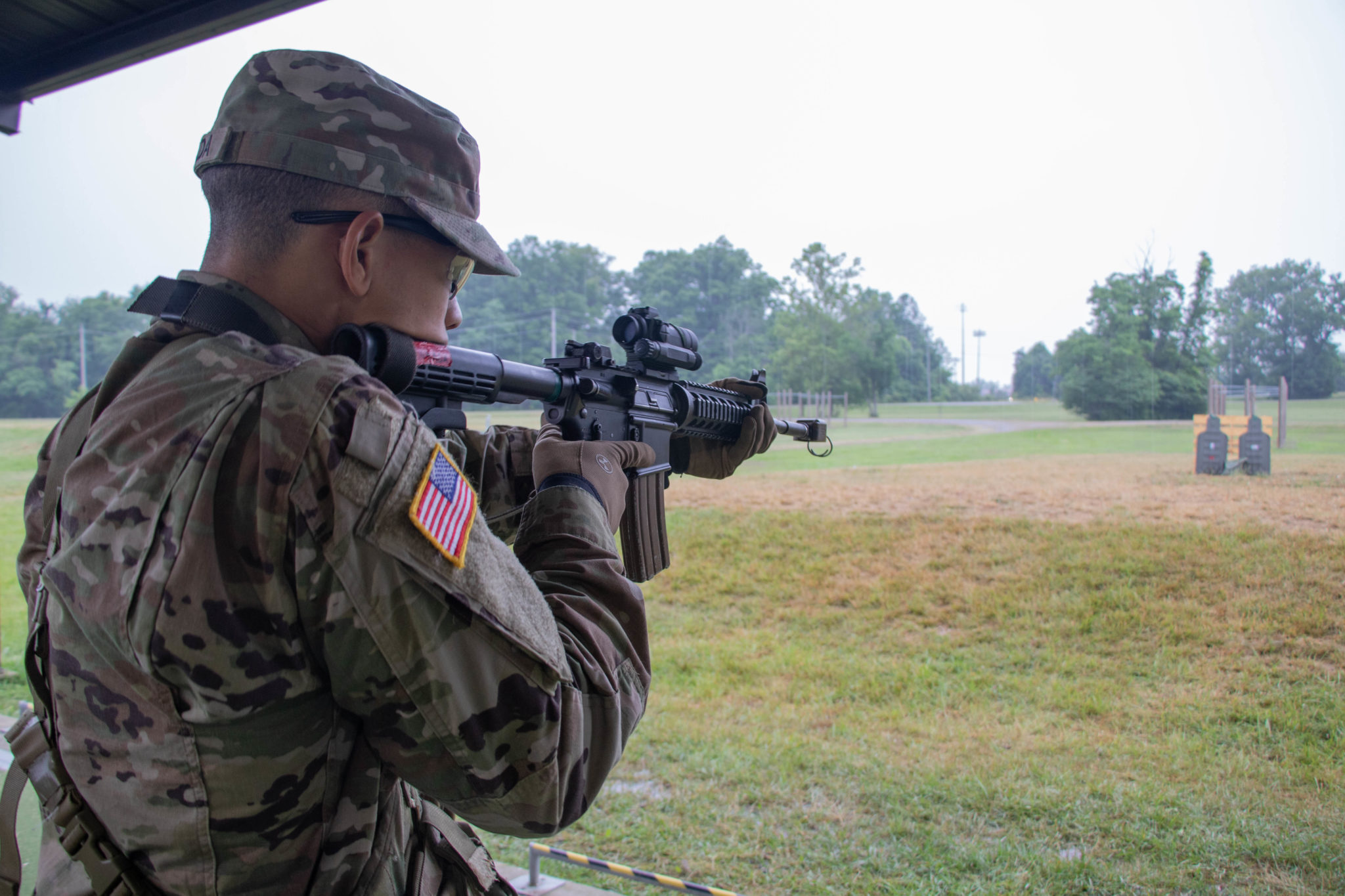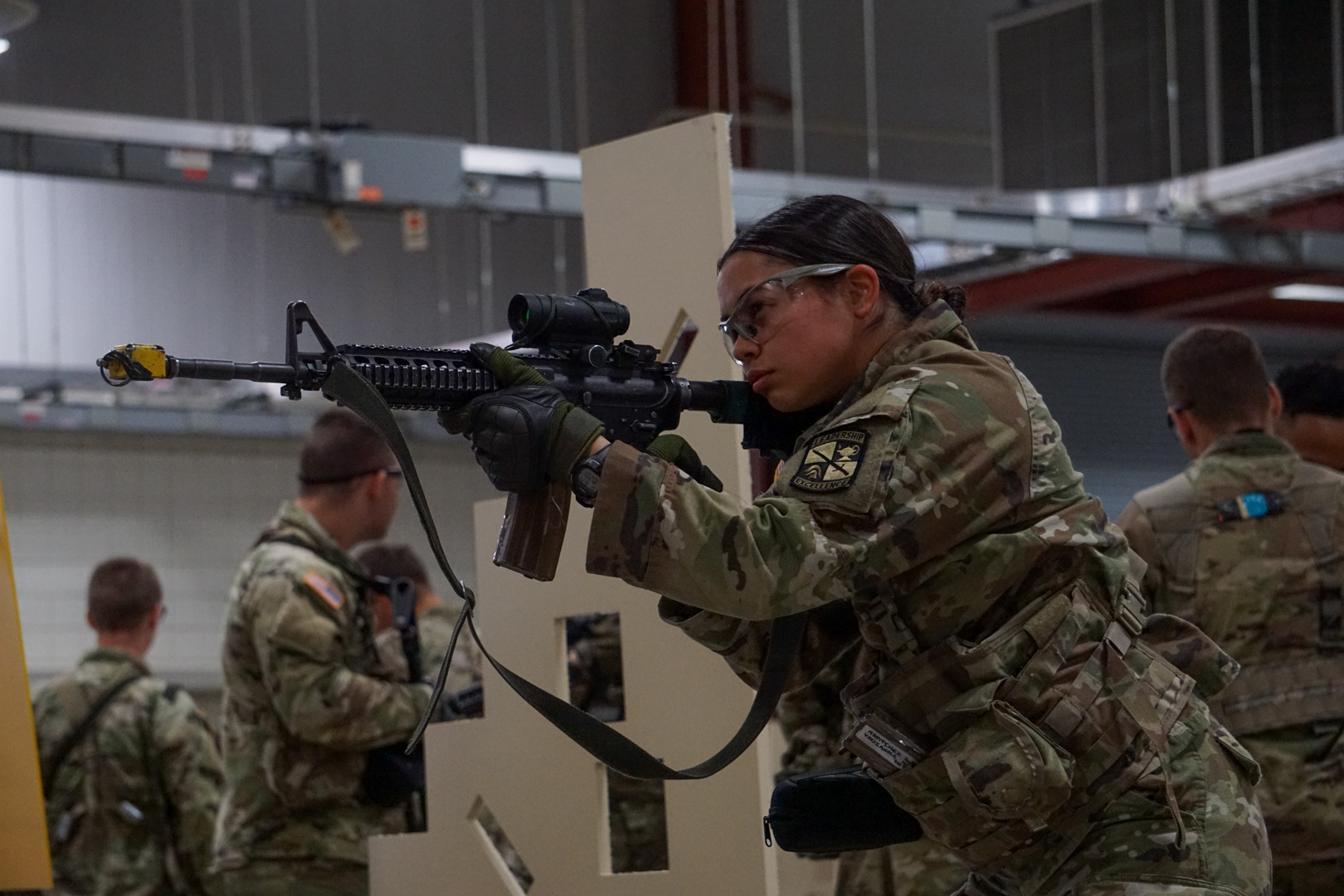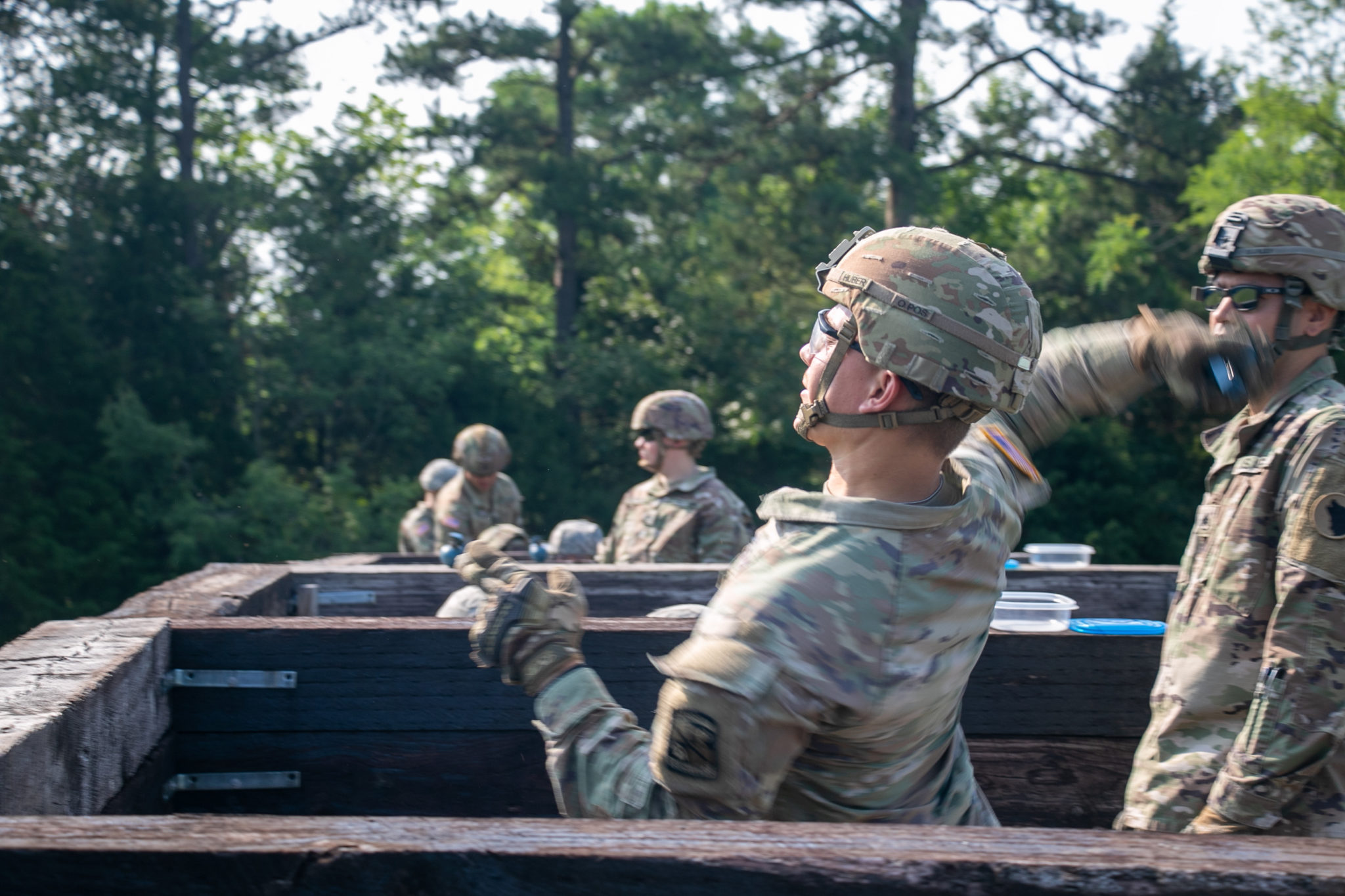By: Madison Thompson
FORT KNOX, Ky. – Lt. Gen. Charles D. Luckey visited 8th Regiment, Basic Camp, Cadets at the Dunagan Teamwork Development Course, July 20, during Cadet Summer Training at Fort Knox. Luckey’s visit covered multiple courses and multiple regiments of Cadets training.
“We’ve been looking at all kinds of different training venues, First Aid, Chemical Biological Radiological Nuclear training events. Spent a little time in the confidence chamber, an Army euphemism for gas chamber,” stated Luckey. “We put on masks, jumped around, did some jumping jacks, breathe deep for a while and, if you’re me after about 45 seconds, you’ve had enough because your eyes are itching and raw, your face is on fire and you’ve got stuff coming out of your nose.”
Before arriving at Dunagan Teamwork Development Course, Luckey spoke with the Public Affairs team on location and was asked about the observed training as well as the Army Reserves.

Lt. Gen. Luckey visiting 8th Regiment, Basic Camp, Cadets at Dunagan Teamwork Development Course during Cadet Summer Training, July 20, at Fort Knox, Ky. Photo by: Madison Thompson
“I’d say that the Army Reserves plays a critical and essential roll in supporting U.S. Army Cadet Command, which is a part of U.S. Army training and doctrine command, in supporting all aspects of ROTC summer camp, which is the Advanced Camp and Basic Camp,” said Luckey. “A lot of Soldiers out of America’s Army Reserve are what we call traditional TPU Soldiers, that means they have civilian jobs. So, for example, the drill sergeants we have here with me this morning. They live all across the United States of America have civilian jobs and their own communities. What we do in the summer time, among a lot of other things in America’s Army Reserve … is we fall in wherever we’re needed to help support the Army in its mission. The critical mission for the Army here is growing new leaders, new lieutenants, for the Army. These drill sergeants are a great example of how America’s Army Reserve supports the Army in their mission.”
Luckey was also asked about how the U.S. Army Reserves impacts Cadets during their training and what it means to be a team with these two components.
“This is America’s Army Reserve. We’re the coolest tribe in western civilization … I have the honor and the responsibility to lead the coolest team on earth, which is America’s Army Reserve. The Army can’t fight without us. The Army can’t train these Cadets without us. The Army relies on the Army Reserve. We’re an integral part of the Army’s ability to generate capability and support the war fighting,” stated Luckey. “We’re not bragging about it. It’s just the way it is. These drill sergeants … are a great example of how we bring extra capability and capacity to the Army across every mission set. So, I would just say it’s a total team. All three components of the Army, the Active Army, the Army Guard and the Army Reserve, all teaming together.”
Luckey spoke to Cadets after the exercise After Action Review was complete about a variety of topics. These topics were derived from question Cadets asked the lieutenant general.
He told them that being part of the Army gave them two things. The first is a mission and a purpose, which Luckey states is, “to support and defend the Constitution of the United States of America against all enemies, both foreign and domestic.” The second is a team.

Lt. Gen. Luckey visiting 8th Regiment, Basic Camp, Cadets at Dunagan Teamwork Development Course during Cadet Summer Training, July 20, at Fort Knox, Ky. Photo by: Madison Thompson
“You have a team. You are not in this alone. We are all in this together. Doesn’t matter if you’re a lieutenant general or a lieutenant or staff sergeant or private or Cadet. If you’ve got your head in the game and you’ve got your heart in it and this is about serving your fellow Soldiers, about supporting and defending the Constitution, about taking care and sustaining the American way of life. We’re all on the same team,” said Luckey.
He then called for questions from the Cadets. The first question was about why he decided to join the Army. His response was, while he was at his university, he was motivated by the fire and drive from Cadets in his classes.
The second question was what is a book he thought all Cadets should read. He gave three suggestions including “Message to Garcia”, “Brown’s Job” and “Try”. He also directed Cadets to a website, www.usar.army.mil, where Cadets could find what he was reading, what he is currently reading and what he plans to read.
The third question was about how it felt to be a general.
“It feels great. I’m happy to be alive. People ask him every morning, how are you doing. He says’ are you kidding me? I’m double eagle six!” It’s the hardest job I’ve ever had. I won’t say it’s the most fun job I’ve ever had, but it’s the most rewarding job I’ve ever had. Because, everyday, I get to do something a little different. Everyday, I get to talk to Soldiers. Everyday, I get to deal with challenges that go from the very tactical to the very strategic,” said Luckey. “The hardest days are when somebody dies and I have to get a notification officially to them and their families before they read about it on an email or twitter. It is a very humbling responsibility.”
In the end, Luckey had these pieces of advice for Cadets as they move forward in their Army careers.
“What they’re learning here are the basic skills that they need to function both in combat and every day as citizen Soldiers, as warriors, as members of the team. So, my advice to them to start off by learning the basics, mastering the basics, listen to my drill sergeants, take instruction, don’t take it personally. These drill sergeants represent the finest non-commissioned officer corps of the United States Army and they’re out here to help these Cadets learn the basic skills they need to develop the confidence and competence to be outstanding Army Officers. Then we build on that,” said Luckey.

Lt. Gen. Luckey visiting 8th Regiment, Basic Camp, Cadets at Dunagan Teamwork Development Course during Cadet Summer Training, July 20, at Fort Knox, Ky. Photo by: Madison Thompson
“All of these are basic skills. What’s happening out here today for Soldiers who’ve just been in the Army four or five weeks is we’re helping them to better understand themselves, their strengths as developing leaders and also some of their weaknesses. They’re helping them get better,” said Luckey. “So I say pay attention, take care of your buddies, take care of yourself and stay focused … the mission ultimately is to lead American Soldiers in combat effectively and bring them all home alive as best as we can.”
Cadet Summer Training brings 8,200 Cadets through Basic and Advanced Camp this summer on Fort Knox. These camps are designed to help challenge, grow and improve various skills and leadership qualities within the Cadets. If you think you have what it takes to be a Cadet or if you are interested in a job after college click the following link: https://my.goarmy.com/info/rotc1/index.jsp?iom=IP08-AUTO-R1NA-BR-XXX-XX-XXX-MO-XX-X-BRCMAC:IP08




